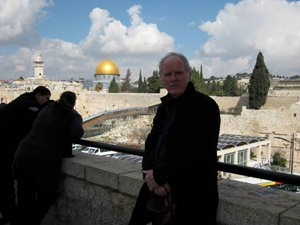

Tuesday, September 6, 2011
Jerusalem. Jerusalem: How The Ancient City Ignited Our Modern World - James Carroll
A Q & A With Author James Carroll

Q: How did you become so personally invested in Jerusalem?
A: When I was young, I was a Catholic priest. After the turmoil of the Sixties, as I began to lose my grip on the priesthood, I needed to retreat to a place of spiritual and emotional sustenance. I spent a summer in a monastery on the edge of Jerusalem, overlooking the hills of the Judean desert. In my time there, and especially during endless forays in the city itself, I encountered a new depth of faith. Jerusalem’s ancient resonance steadied me - not so much its traditional shrines, but its character as a place in which humans had transcended themselves age in and age out. It may seem odd to say so, but I came of age in Jerusalem. The figure of Jesus was quite real to me. I was able both to make the momentous decision to leave the priesthood, and to claim my Catholic faith in a new way. Of course, I was shocked by the contentions of Jerusalem, but those too were to the point. Where better for a young man in turmoil to find himself than in a place that is and has always been defined by turmoil?
Q: How did your work on anti-Semitism in Constantine’s Sword influence your perceptions of Jerusalem?
A: The Israelis and the Palestinians are trapped in a corner - but it’s not a corner of their own making. One of its walls is the long history of anti-Semitism that took root in Western civilization. Christian theology almost from the start assumes that Jews are to be exiled from the Jewish homeland. Christians take that exile - the so-called wandering Jew - as a proof of the claims that Jews reject. The collective, if unconscious, psyche of European culture is stamped with this denigration of Jews, tied to Jewish absence from Jerusalem. This accounts for much of the ambivalence about the Jewish return to Israel in 1948 (The Vatican, for example, did not recognize the state until 1994). It also accounts for a broad readiness to hold the State of Israel to higher standards of human rights than other states. Criticism of Israeli policies toward Palestinians is not anti-Semitism, but Israel’s continuing vulnerability is at least in part explained by a widespread visceral uneasiness with Jews at home in Jerusalem.
Q: What is the second wall of the corner trapping Israelis and Palestinians?
A: Well, of course, it is colonialism. Just as Jews are still somehow at the mercy of deep history, so are Arabs. In their case, it is the history of racist, European contempt for colonized people. It is wrong to equate Zionism with colonialism, but Palestinians have every reason to regard their situation as an unjust consequence of 19th and 20th century imperial intrusions. The British method of colonial domination depended on stirring up local conflicts, whether in Ireland, India, or Palestine. That method still casts a shadow over Jerusalem, where seeds of Jewish-Arab conflict were so efficiently planted by the colonizers. In fact, the British decimated Palestinian civic and cultural institutions well before Israelis came to power. European anti-Semitism and colonialism have left a crippling legacy that amounts to a third party in the Israeli-Palestinian conflict - but that third party is unacknowledged and unidentified. No one who shares in Western civilization has the right to condescend to the Jews and Arabs who are locked in this combat. I wrote this book to name that third party because only then can its power be undone.
Q:But how is the rest of the world tied to Jerusalem and its problems?
A: TQuite profoundly, although mostly unconsciously. It is not too much to say that the Western imagination - not just Europe now, but also America - took root and flowered in Jerusalem, more even than in Athens, Rome, or any other place. This begins, of course, with the Bible, and with the story of Jesus - Jerusalem is ground zero of Jewish and Christian religion. But across the centuries, the city remained pivotal. At the Crusades, Christendom "lost" Jerusalem to the Muslims, and the Biblical idea of a heavenly Jerusalem took on new force. Jerusalem as fantasy and as dream shaped Europe’s idea of itself - and also its adventures and, ultimately, explorations. Christopher Columbus was driven by the idea of reclaiming Jerusalem, but so were the Puritans who came to New England. America understood itself from the start as a new Jerusalem, the "city on a hill." That vision influenced everyone from John Winthrop and Abraham Lincoln to Ronald Reagan and Sarah Palin. Today, a new American Christian nationalism takes its energy from apocalyptic fantasies fixed upon Jerusalem - which plays out even in the ways U.S. foreign policy treats Israel.
DOWNLOAD JERUSALEM. JERUSALEM: HOW THE ANCIENT CITY IGNITED OUR MODERN WORLD - JAMES CARROLL
No comments:
Post a Comment